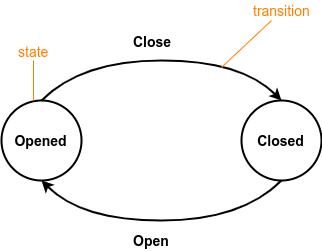1
2
3
4
5
6
7
8
9
10
11
12
13
14
15
16
17
18
19
20
21
22
23
24
25
26
27
28
29
30
31
32
33
34
35
36
37
38
39
40
41
42
43
44
45
46
47
48
49
50
51
52
53
54
55
56
57
58
59
60
61
62
63
64
65
66
67
68
69
70
71
|
Introduction to objects
=======================
Introduction
------------
In SurgeScript, objects are units of code and data. Each object defines a finite state machine, a mathematical construct used to describe the behavior of in-game objects.
> **Did you know?**
>
> Games implement what is called a game loop. In SurgeScript, the game loop is defined implicitly via state machines. State machines are one of the key features of SurgeScript.
State machines
--------------
A finite state machine is a mathematical abstraction composed of a finite number of **states** and by **transitions** between these states. Only one state can be active at any given time (we'll call it the **active state**). There must be one **initial state** (i.e., the first one to be active). A transition is a change of the active state that is triggered when a certain condition is met.
As a concrete example, suppose that you want to create a door in your game. You, the developer, may open or close the door at will. But what is a door? We have just given *informal* description of the problem. However, we need to transform it in something more rigorous. Example:
A door is an object with two states (see the Figure below):
- Opened (initial state)
- Closed

From the Opened state, only one transition is possible: Close. Once the Close transition is called, the door will go to the Closed state. Conversely, from the Closed state, only one transition is available: Open. When the Open transition is executed, the door will return to the Opened state.
Objects in SurgeScript
----------------------
In SurgeScript, each object has a name. Objects may have any number of states you'd like. The initial state is always called **main**. The syntax is as follows:
```
object "name of the object"
{
state "state name"
{
// code goes here
}
}
```
The following code shows an example of a door that opens and closes (it keep changing states) every 2 seconds:
```
object "Cosmic Door"
{
state "main"
{
// the object starts at the main state
state = "opened"; // go to the opened state
}
state "opened"
{
if(timeout(2)) // if we have been on the opened state for 2+ seconds
state = "closed"; // go to the closed state
}
state "closed"
{
if(timeout(2))
state = "opened";
}
}
```
Notice how the code just shown defines states and transitions between these states. Each state contains its own code.
**Note:** once a state is active, its code will be repeated at every frame of the application until the state changes or until the object is destroyed.
|